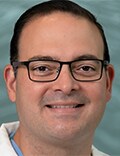Spanish-Speaking Navigators Aid Latinx Patients in CRC Screening

A Spanish-speaking patient navigator dramatically increased the percentage of Hispanics undergoing colorectal screening with colonoscopies in Providence, Rhode Island.
Screening colonoscopies are a well-established approach to reducing colorectal cancer mortality by identifying and removing polyps. However, Hispanics in the United States lag behind the general population in completion rates for screening colonoscopies.

Dr Abdul Saied Calvino
“Starting colorectal cancer colonoscopy screening at age 45 saves lives. But this life-saving procedure is underutilized by certain populations, not only because of limited access to care but because of cultural, language, and educational barriers that exist,” Abdul Saied Calvino, MD, MPH, program director of the Complex General Surgical Oncology Fellowship at Roger Williams Medical Center, Providence, Rhode Island, told Medscape Medical News.
Tailored patient navigation is effective but has not been widely adopted. The new study is one of the first to look at the ‘real-life’ impact of these types of programs in the Hispanic population, Calvino and his colleagues reported today in the journal Cancer.
Colorectal cancer is the second leading cause of cancer-related death in the United States overall and the third-most diagnosed cancer site, according to the American Cancer Society. Among Hispanics, colorectal cancer is the second leading cause of cancer mortality and the second-most diagnosed site of malignancy.
Calvino and his colleagues sought to learn if a culturally tailored patient navigation program could improve rates of screening colonoscopies among Hispanic residents in Providence.
The hospital hired a dedicated Spanish-speaking navigator/coordinator and enrolled 698 men and women into the program.
The navigator sent introductory letters in Spanish to study participants, made phone calls to educate patients about the importance of cancer screening, and called again to ensure that all potential barriers to colonoscopy were overcome, Calvino said. Colonoscopy completion, cancellations and no-shows were recorded. Participants were followed for 28 months.
The program proved highly successful, according to the researchers. At the end of the study period, 85% of patients — exceeding the national goal of 80% set by the American College of Gastroenterology — had completed testing, with no differences between men and women; the cancellation rate was 9% and only 6% of patients failed to show up for endoscopy.
Among the group that underwent colonoscopy, 254 (43%) had polyps removed and eight (1.3%) required colectomy, the researchers reported. Five patients (0.8%) were diagnosed with malignancy.
Calvino attributed the 15% combined rate of no-shows and cancellations to the cost of the procedure (co-payment, out-of-pocket expense, and loss of wages) and the inability to follow-up with those patients. He added that 90% of those who completed the procedure said that without the patient navigation program they would not have completed the screening colonoscopies.
Aimee Afable, PhD, MPH, an expert on health disparities and immigrant health at Downstate Health Science University, New York City, called the new study small but “important.”
Afable said strong evidence supports the ability of patient navigation programs to improve the reach and impact of screening programs aimed at the underserved. However, hospitals typically do not adequately fund such initiatives. (Calvino said the program at Roger Williams started with a grant from the OLDCO Foundation and is now supported by his institution.)
“In 2022, post-COVID, it is common to see healthcare support staff leaving institutions, hospitals because they’re not being paid well, and they are overburdened,” Afable told Medscape. “Patient navigation is not, unfortunately, a routine part of healthcare in the US despite its central role in ensuring continuity of care.”
Funding for the study was provided by a grant from the OLDCO Foundation. Co-author John C. Hardaway, MD, PhD, reports being a cancer liaison physician for the American College of Surgeons. The other authors have disclosed no relevant financial relationships.
Cancer. Published online February 7, 2022. Full text
Howard Wolinsky is a medical writer in Chicago.
For more news, follow Medscape on Facebook, Twitter, Instagram, YouTube, and LinkedIn
Source: Read Full Article